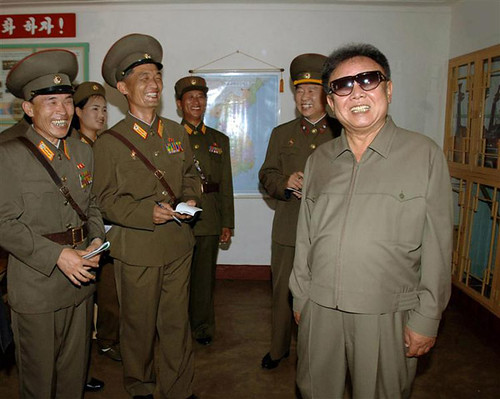Well, let's just say I think it's unlikely. Tensions are high, and the North's provocative sinking of a South Korean warship requires a response. But what should that response be?
War is out of the question, at least from the American and South Korean side. North Korea could, if open hostilities commenced, inflict not-inconsiderable damage on the South, particularly Seoul, and possibly on Japan as well. A war would also have a destabilizing effect on the entire region, and could prompt a massive refugee crisis that all states, especially China, would like to avoid.
And what of sanctions? Well there really aren't many sanctions available to the international community that aren't already in place. Pyongyang has persevered under a myriad of sanctions over the years, with little discernible change in policy, and that option seems exhausted, save as a gesture of international condemnation.
So what can be done? Not much, it appears, unless South Korea, the US, China, Japan, and the UN Security Council agree to mount a large-scale invasion and regime-change operation. Needless to say, the odds of that happening are slightly smaller than winning the Powerball.
I believe the more pressing concern is about motivation - why did Kim Jong Il choose to attack a South Korean warship? I'm no expert on North Korea, but it seems to be an attempt to maintain his "irrational actor" status. If you accept that he is irrational, potent options - such as limited military strikes or more robust targeted sanctions - must be shelved under the notion that they may cause him to overreact, possibly with nuclear weapons. I think he is an eminently rational actor, interested solely in maintaining power and ensuring the succession of the family dynasty. If that is his goal, acting like a crazy person to keep the rest of the world off-balance is actually not so crazy. However, calling his bluff with surgical strikes is an extremely dangerous gamble with little upside.
The other key consideration is China. Beijing has been North Korea's most ardent supporter, and Chinese food aid nourishes many North Koreans. China fears the after-effects of a destabilizing regime change, with refugee flows across the border causing domestic upheaval. Kim Jong Il took a recent "secret" trip to China, and while the full contents of his conversations are not public it's safe to assume that the sinking of the Cheonan was on the agenda. As usual, China holds the balance of power and can influence the direction of future talks.
My prognosis: nothing. The Security Council may pass a few additional impotent sanctions, and South Korea will verbally lambaste the North, but no concrete action will be taken. Eventually the six-party talks will resume, with the status quo unchanged.
Share This! (the gift that keeps on giving)
Latest Analysis
D&D Contributors
The D&D Vault
-
▼
2010
(168)
- 10/17 - 10/24 (2)
- 10/10 - 10/17 (1)
- 09/26 - 10/03 (2)
- 09/19 - 09/26 (2)
- 09/12 - 09/19 (1)
- 08/29 - 09/05 (1)
- 08/22 - 08/29 (2)
- 08/08 - 08/15 (1)
- 08/01 - 08/08 (1)
- 07/25 - 08/01 (2)
- 07/18 - 07/25 (3)
- 07/11 - 07/18 (2)
- 07/04 - 07/11 (5)
- 06/27 - 07/04 (2)
- 06/20 - 06/27 (9)
- 06/13 - 06/20 (3)
- 06/06 - 06/13 (1)
- 05/30 - 06/06 (3)
- 05/23 - 05/30 (1)
- 05/16 - 05/23 (1)
- 05/09 - 05/16 (2)
- 05/02 - 05/09 (2)
- 04/25 - 05/02 (4)
- 04/18 - 04/25 (6)
- 04/11 - 04/18 (8)
- 04/04 - 04/11 (8)
- 03/28 - 04/04 (9)
- 03/21 - 03/28 (5)
- 03/14 - 03/21 (2)
- 03/07 - 03/14 (5)
- 02/28 - 03/07 (8)
- 02/21 - 02/28 (8)
- 02/14 - 02/21 (10)
- 02/07 - 02/14 (13)
- 01/31 - 02/07 (8)
- 01/24 - 01/31 (11)
- 01/17 - 01/24 (8)
- 01/10 - 01/17 (6)




.jpg)